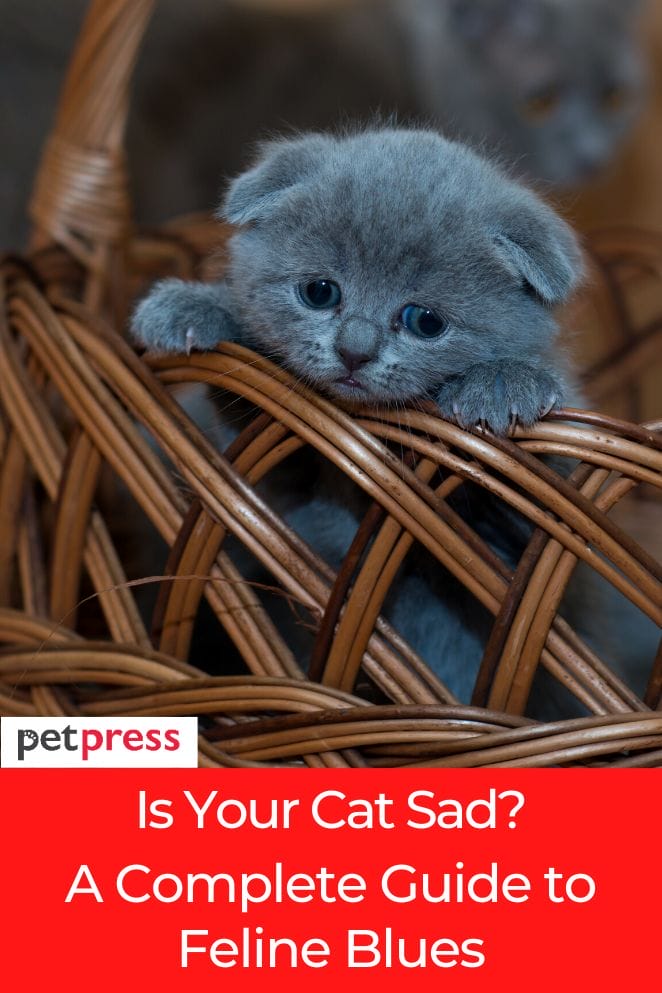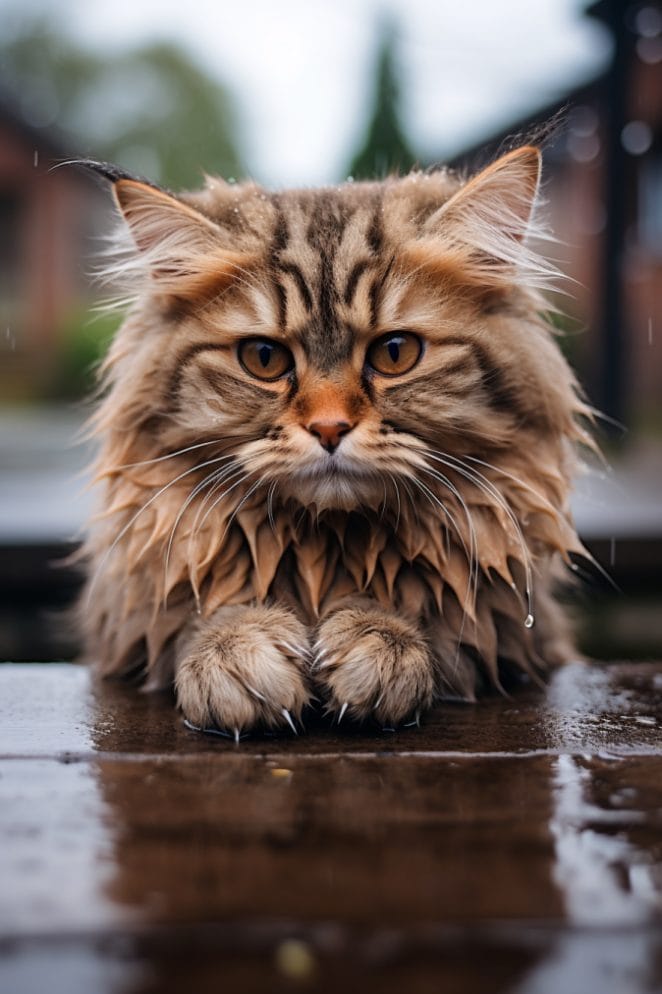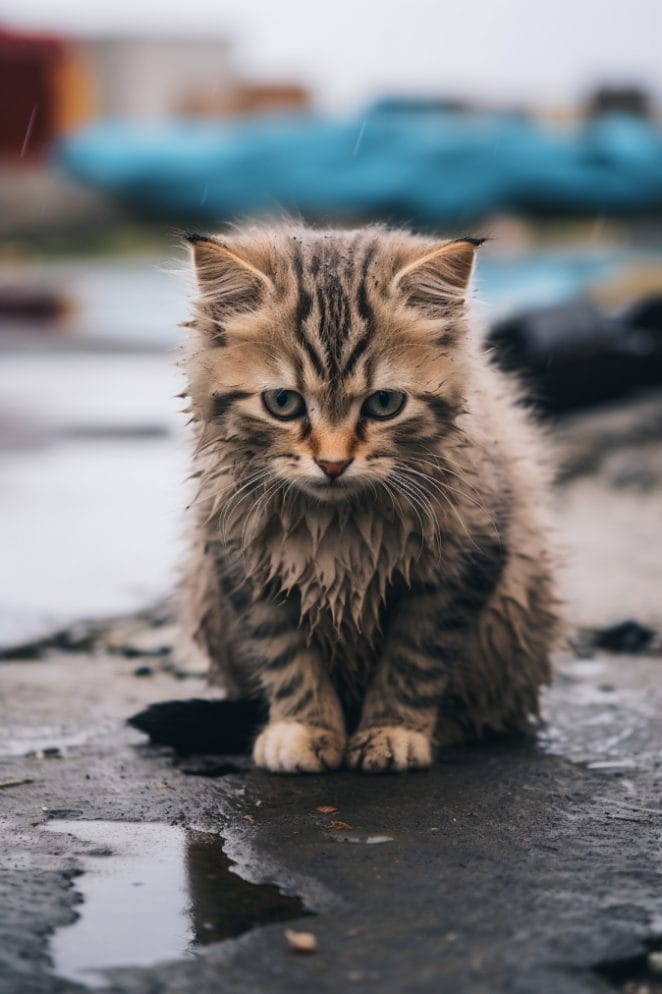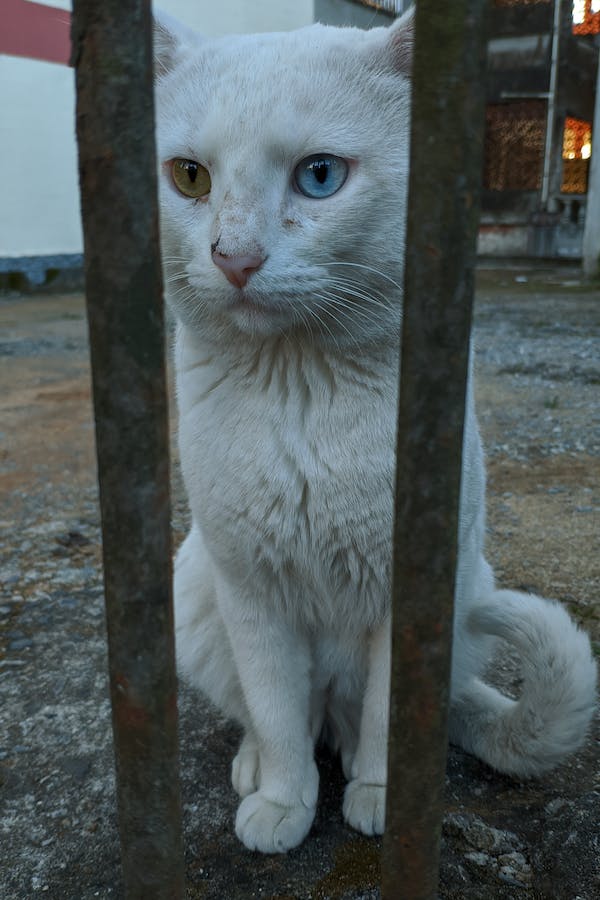
Similar to humans, cats can undergo emotional experiences, including feelings of sadness and depression.
It is crucial to be observant of the signs indicating a sad cat and to grasp the elements influencing their emotional well-being.
In this blog post, we will delve into the causes of cat depression, highlight key indicators to watch for, and provide strategies to improve your cat’s emotional state.
By exploring these aspects, we aim to equip cat owners with insights into fostering a happier and healthier environment for their feline companions.
Signs of a Sad or Depressed Cat
Recognizing when a cat is experiencing stress, anxiety, or depression involves observing certain behavioral cues. These signs may include:
- Low energy levels: Observe a decrease in your cat’s usual activity level, such as reduced playfulness or lack of interest in their surroundings.
- Grooming changes: Noticing alterations in grooming habits, which may manifest as either excessive grooming or a decline in overall grooming activity.
- Changes in appetite: Monitoring shifts in eating patterns, whether it’s a noticeable decrease or increase in appetite.
- Change in daily routine: Detect deviations from your cat’s regular daily routine, including disruptions in sleep patterns or avoidance of usual activities.
- Aggression: Witnessing heightened aggression or irritability, which may be expressed through hissing, swatting, or biting.
- Hiding or retreating: Noting instances where your cat seeks solitude, hides, or withdraws from interactions with family members.
- Lethargy or changes in personality: Recognize lethargy or alterations in your cat’s usual personality traits, such as increased aloofness or a lack of responsiveness.

Reasons Why a Cat Gets Sad and Depressed
Cats can become sad or depressed due to various reasons, such as:
- Changes in routine: Alterations in the cat’s daily schedule or environment can lead to stress and emotional discomfort.
- Aggression or bullying from other pets: Experiencing aggression or bullying from fellow pets in the household can significantly impact a cat’s emotional well-being.
- Loss of a family member or companion: The departure or loss of a family member, whether human or another pet, can induce sadness and a sense of loneliness in cats.
- Illness or injury: Physical ailments or injuries can cause discomfort and contribute to changes in a cat’s mood and behavior.
- Moving to a new home: Relocating to a new home can be a stressful experience for cats, leading to feelings of insecurity and sadness.
- Loneliness: Cats are social animals, and prolonged periods of isolation or lack of interaction can result in loneliness and a decline in their emotional state.
Can Cats Die from Depression?
While the direct cause of death from depression in cats is unlikely, it’s crucial to recognize the potential health risks associated with prolonged emotional distress.
Cats, when experiencing depression, may develop hepatic lipidosis, commonly known as fatty liver syndrome, due to a reduced appetite and not eating adequately.
This condition can be fatal.
However, the good news is that with proper care and attention, cats can recover from depression.
How to Help a Sad Cat

To help your cat feel better, consider the following strategies:
Spend quality time together
Dedicate your undivided attention to your cat. Engage in interactive play, gentle petting, or simply sit together.
This bonding time reassures your cat of your presence and care, fostering a sense of security.
Introduce new toys and games
Keep your cat mentally stimulated and entertained by introducing new toys and games.
This helps divert their focus, providing both mental and physical stimulation.
Rotate toys regularly to maintain interest.
Use pheromones
Pheromone diffusers, available at pet stores, emit calming scents that can help alleviate stress and anxiety in cats.
Placing these diffusers in areas your cat frequents can contribute to a more relaxed environment.
Consult your veterinarian
If your cat’s depressive behavior persists or worsens, it’s crucial to consult your veterinarian.
Persistent sadness could be a sign of underlying health issues, and a professional assessment can rule out any medical concerns.

Conclusion
Cats, like humans, have emotions that require recognition and attention.
It’s vital to be aware of the signs indicating a sad cat and respond with appropriate care.
By understanding these signs and providing the necessary attention, you can contribute to your feline friend’s emotional well-being and overall health.
Ensuring that your cat feels understood and supported enhances the bond between you and your furry companion, fostering a positive and thriving environment.
FAQs
Yes, cats can experience depression, but it is usually a short-term issue.
Signs of a depressed cat include low energy levels, grooming changes, changes in appetite, and hiding or retreating.
Cats can become depressed due to changes in routine, loss of a family member, illness, injury, moving to a new home, loneliness, or grieving.
While it is unlikely, cats can develop hepatic lipidosis (fatty liver syndrome) from not eating, which can be fatal.


GIPHY App Key not set. Please check settings